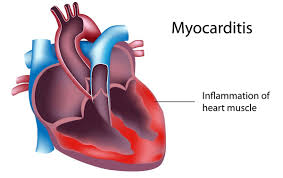Myocarditis, an umbrella term for an assortment of potentially deadly heart disorders, is on the rise.
Often caused by infection and inflammation, myocarditis can affect anyone, but the picture of who is at risk is becoming a little clearer.
Men are twice as likely as women to develop severe and possible fatal reactions. And new research shows that the risk of sudden cardiovascular death is relatively high.
Myocarditis accounts for about 5 percent of sudden cardiovascular infant deaths and up to 20 percent of sudden cardiovascular deaths in adolescents. In adults, the disorder may result in heart enlargement and heart failure.
In addition, the heart may be so damaged that myocarditis is responsible for up to 45 percent of heart transplants in the U.S.
The most common cause of myocarditis is an infection ― usually viral ― that can damage heart muscle chronically or acutely in otherwise healthy people.
Myocarditis has other causes, including autoimmune diseases, environmental toxins, and adverse reactions to medications. Successful treatment of myocarditis depends on early diagnosis.
Myocarditis may have no warning symptoms, but when it does, here are the signs to watch for:
- Shortness of breath during exercise at first, then at night while lying down
- Abnormal heartbeat, which causes fainting in rare cases
- Lightheadedness
- A sharp or stabbing chest pain or pressure, which may spread to your neck and shoulders
- Fatigue
By Dr. Chauncey W. Crandall


